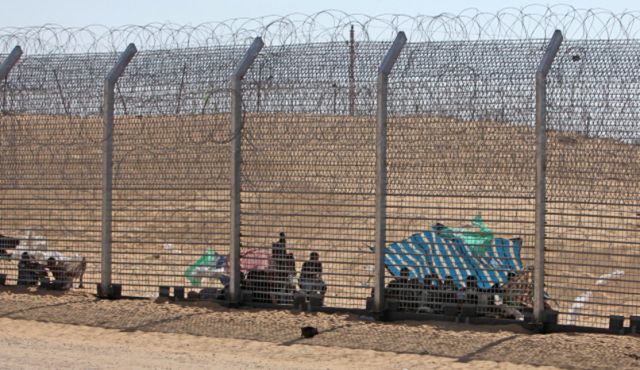 In September a group of 21 Eritreans was trapped at the Israeli border fence for more than a week, before they were chased away in the direction of Egypt. (See also here).
In September a group of 21 Eritreans was trapped at the Israeli border fence for more than a week, before they were chased away in the direction of Egypt. (See also here). The Israeli military has since June 2012 prevented dozens of asylum seekers, most of them Eritreans, from crossing Israel’s newly constructed fence on its border with Egypt, Human Rights Watch, the Hotline for Migrant Workers, and Physicians for Human Rights – Israel said today. Israel has also unlawfully deported dozens more back to Egypt, the three groups said.
Israel should stop rejecting asylum seekers at the fence unless its officials determine in a fair procedure that they do not face threats to their lives or freedom or inhuman and degrading treatment because of that rejection. The 1951 Refugee Convention, to which Israel is a state party, customary international refugee law, and international human rights law require all countries to respect the principle of nonrefoulement, which prohibits the return of anyone to a place where their life or freedom would be threatened or where they would face the threat of torture or inhuman and degrading treatment. This means anyone seeking asylum may not be summarily rejected at the border and may not be deported unless their claim has been fairly determined.
At least seven times since June, Israeli forces patrolling Israel’s newly constructed 240-kilometer border fence with Egypt’s Sinai region have denied entry to dozens of Africans, mostly Eritreans, thousands of whom continue to flee persecution in their country every year.
In July, Israeli forces also detained about 40 Eritreans just inside the Israeli border and then forcibly transferred them to Egyptian custody.
Based on Israeli government figures, about two-thirds of those trying to cross the border are from Eritrea, where Human Rights Watch has documented widespread and severe abuses against people seeking to avoid mandatory and indefinitely prolonged national service on wages barely sufficient to survive, and against adherents of “unrecognized” religions and government critics.
The United Nations High Commissioner for Refugees (UNHCR) says that more than 80 percent of Eritreans who claim asylum worldwide are recognized as refugees.
Recent interviews with Eritreans arriving in Israel confirm that many passing through Sinai to reach Israel are facing serious abuses, including torture and rape, by traffickers in Sinai who hold the Eritreans for ransom. Those who pay are allowed to travel onward to reach the Israeli border.


.jpg)


No comments:
Post a Comment